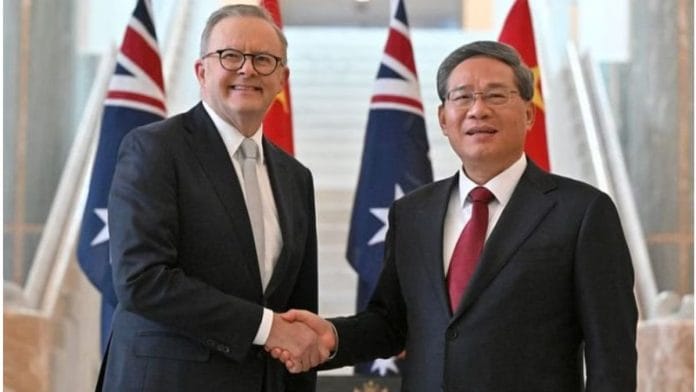Chinese Premier Li Qiang’s recent visit to Australia signals a pivotal moment in China’s efforts to strengthen ties with a select few countries. The visit – the first by a Chinese premier in seven years – came with significant economic inducements. These included the loan of new pandas, the easing of restrictions on Australian produce, as well as Australia’s inclusion into China’s visa-waiver programme. This diplomatic outreach to Australia has been ongoing, exemplified by Australian Prime Minister Anthony Albanese’s visit to China last November and Chinese foreign minister’s Wang Yi’s trip to Australia in March this year.
These developments follow a period of strained trade relations, highlighted by China’s hefty tariffs on Australian wine and Australia’s call for an independent Covid-19 pandemic inquiry.
Why’s China focused on Australia?
Australia, a key security ally of the United States and a member of both the Quad and AUKUS (Australia, United Kingdom, US), holds strategic importance for China. Beijing’s proactive approach accentuates its efforts to influence a Quad member state. The Quad, originally formed in 2007 as a security forum involving the US, Japan, Australia, and India, had been dormant for a decade due to objections from Beijing. However, it has since reemerged with a focused agenda, addressing regional challenges and implicitly countering China’s assertiveness.
China’s renewed focus on Australia, amid measured engagement with other Quad countries such as India and Japan, highlights its strategic manoeuvrings. Chinese high-ranking officials carefully select visit locations where they foresee a welcoming reception and opportunities for mutual benefits. This showcases China’s approach toward influencing key US allies and regional partners.
Also Read: Xi Jinping didn’t wish Modi. Chinese people say he isn’t invincible, chatter about Rahul
Is Australia a weak link?
India was historically viewed as a potential weak link in the US-led coalition against China. Now, it has evolved into a significant counterbalance as concerns about Australia’s commitment to regional security have emerged. Despite being a member of both the Quad and AUKUS, Australia’s engagement tactics with China raise concerns about its commitment to regional security and its apparent prioritisation of economic gains over a collective approach.
Chinese state media’s coverage of Australia and Li’s visit appears notably positive and more tempered compared to their coverage of India and the US. Generally, Australia is being portrayed as showing increased warmth toward China. Much of the discourse revolves around the perceived turnaround and the projected stabilisation in China-Australia relations. China’s Ambassador to Australia, Xiao Qian, even penned an article suggesting Li’s visit marks a new chapter in China-Australia relations.
However, internal perspectives in China vary. Some advocate for Australia to adopt a more independent foreign policy less influenced by the US. Critics within China’s strategic circles urge Australia not to solely view China through a security lens shaped by US interests, which they contend has been politicised and weaponised by Washington.
Chen Hong, director of the Australian Studies Centre at the East China Normal University, has criticised the Scott-Morrison-led former administration for its adversarial stance toward China. Trade issues should not be manipulated for political ends, he has stressed.
Others have argued that Australia’s economic reliance on China necessitates fostering a cooperative political environment and mutually advantageous economic partnership. To magnify economic benefits and shape the narrative, a deluge of commentaries in Mandarin has underscored the immediate advantages of lifting excessive import duties on Australian wine, expanding market access for Australian produce, and offering visa benefits.
Despite the symbolic gestures during Li’s visit, trust in the China-Australia relationship remains tenuous. An article suggested that the Chinese leadership is cautiously assessing the course of their relationship with Australia amid persistent differences.
Also Read: China claims to build a community at Shangri-La, then threatens Taiwan with ‘destruction’
Stability needs more than panda diplomacy
Penny Wong, Australia’s Foreign Minister, while receiving Li at the airport emphasised: “A stable relationship between Australia and China benefits both countries and our region.” However, achieving stability necessitates more than symbolic gestures like official visits, panda diplomacy, or the lifting of economic restrictions.
It is imperative to engage China in substantive dialogue. Simultaneously, it is equally crucial to ensure that China addresses the concerns that destabilised its relationship with Australia in the first place.
China has actively shaped the agenda, emphasising Australia’s economic dependence on Beijing and suggesting that economic gains should take precedence over differences. Beijing employs a strategy of leveraging economic relations to align countries with its long-term objectives. Li’s recent visit to Australia exemplifies China’s tactic of using economic reliance to influence policy outcomes in its favour. While Australia promptly reaffirmed adherence to the One China policy in a joint statement, it must also uphold its contributions to regional peace and stability and push China on critical issues.
China’s actions indicate a deliberate attempt to undermine cooperation among Quad members, seeing Australia as particularly vulnerable. Australia must navigate the challenge of maintaining a delicate balance, serving as a responsible stakeholder committed to security and stability. It must also resist inducements that could compromise these principles in pursuit of economic gains from China.
Sana Hashmi, Ph.D., is a fellow at the Taiwan-Asia Exchange Foundation and George H. W. Bush Foundation for U.S.-China Relations. She tweets @sanahashmi. Views are personal.
(Edited by Zoya Bhatti)






